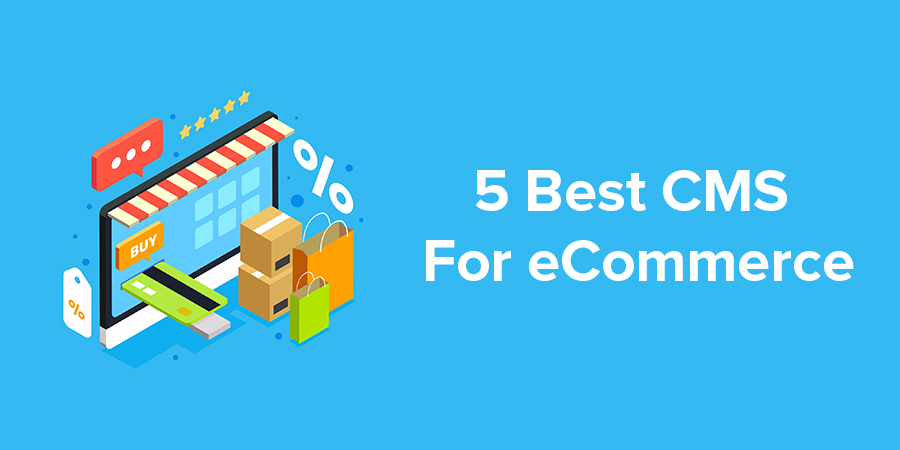Online eCommerce stores have entirely changed the purchasing experience of their users as it offers reliable and secure buying experience to their users with a variety of products and services. This is why most entrepreneurs show their keen interest in an eCommerce business and think of building an online eCommerce store to start their business.
But the fact is that several eCommerce stores in the market are already doing a great job in terms of products and services. So how can you make a place in the market? How can you improve your eCommerce business? Is only building an eCommerce website sufficient? Well, it’s a fact that in the initial stage, you might have to face some hardships to make your online presence because the optimization process takes some time to show positive results.
But one thing you have to worry about is the building process of your website. You should know which CMS (Content management system) you need. The chosen CMS should be good in terms of security and reliability and meet your business requirements.
To help you, we have compiled a list of the top five CMS platforms that you can choose from to develop an appealing eCommerce website. But first, let’s give a quick glance at CMS.
What is CMS?
CMS is a tool, or software, used to manage the creation and modification of digital content. It is basically used for ECM (Enterprise Content Management) and WCM (Web Content Management). This software allows eCommerce store owners to build, edit, and publish digital website content without writing a single word of code.
By digital content, we mean videos, images, documents, marketing materials, etc. A content management system enables users to modify the feel and look of the store, such as changing the layout of the product, adding new website sections to promote products, or adding promotional banners.
Essential Features of CMS
- Collaboration platform
- Wizards installation and upgrade
- Template customization
- Modularity and extensibility
- Version management
- User and group functionality
- Integration of audit logs
1. Shopify
Shopify is a flexible and renowned eCommerce platform that allows anyone to start an online store. Its affordable pricing and straightforward interface have Shopify as one of the best options for startups and small businesses. But it’s not like brands can’t use this CMS. You’ll find different features for your business from other buying plans in Shopify.
Shopify is one of the most popular eCommerce platforms, with around 23% of the market share. Due to the flexibility of Shopify, available on there are over 6000 apps on the Shopify App store to customize the user experience.
Features of Shopify
- Easy to set up and manage
- Store Management Features
- SEO and Marketing to boost sales
- Exceptional Security
- Top-notch support
- Enable mobile commerce shopping cart
- Fulfill multiple orders with only one click
- Easily customize storefront with templates
2. Magento
Magento is another known name on our list of eCommerce CMS. It is an open-source platform that allows store owners to build their online eCommerce store quickly. Magento is suitable for all business sizes and needs for mobile commerce, B2B, omnichannel, etc.
Magento is part of the Adobe experience cloud that gathers all of your marketing techs in a single place. This helps you manage content to deliver email campaigns to automate your ad buying and success measuring—the current stats of Built With a show that there are 201,872 live Magento websites all over the globe.
Features of Magento
- Analytics and Reporting
- Catalog Management
- Customer Accounts
- Payment & Shipping
- Order Management
- Search Engine Optimization
- Site Management
- Mobile Commerce
- Marketing and Promotional Tools
- Product Browsing
3. WooCommerce
WooCommerce is one of the leading eCommerce platforms in the world for CMS. Following the statistics of BuiltWith, there are 4,414,537 live websites using WooCommerce on their eCommerce websites. In 2021, WooCommerce gained 22% of the market share, which is quite good.
WooCommerce is an open-source eCommerce plugin for WordPress. A large number of users are attracted to this platform because it offers numerous extensions and free themes to its users. One best things about WooCommerce is that it enables multiple features to the basic WooCommerce in a single click.
Features of WooCommerce
- Seamless WordPress Integration
- Open Source Development Platform
- Large Library of Extensions
- In-Built Payment Processing
- Managing Orders is As Easy as a Pie
- Built-in Blogging Feature
- In-Depth Documentation
- Local Customization
- SEO Advantage
- Products Sorting & Rating
- Extensive Theme Options
- Simple & Robust
4. PrestaShop
PrestaShop is an open-source platform that is written in the renowned PHP programming language with the help of MySQL database management. PrestaShop offers – excellent list management with distinct product displays, built-in SEO characteristics, easy check out mechanisms, quick updates to inventory, fast import and export options, multiple payment tools, excellent administrative interface, security, and marketing tools for a retailer,
Globally 720,585 websites are using PrestaShop. Out of this, 322,338 websites are live. PrestaShop offers integration with third-party platforms like Amazon and eBay; you can also sell your products on these platforms through integration. When we integrate our eCommerce website with big businesses like Amazon, it enhances the search engine rankings of our web pages.
Features of PrestaShop
- Unlimited listings,
- Advanced SEO capabilities
- Creation of custom promotions
- Large selection of payment options
- Precise shipping estimation
- Inventory Management Features
- Customer emails automation
- Advanced navigation and search
- Multiple store management
5. BigCommerce
BigCommerce is one of the advanced and leading eCommerce CMS that allows startups and established companies to accelerate their business. It is one of the powerful platforms that comes with an easy-to-use interface and advanced in-built features.
BigCommerce offers multiple customization options and built-in features to its clients, which is why this platform has attracted 55,00 merchants of all sizes. According to BuiltWith statistics, there are 53,646 live BigCommerce websites all over the world.
Features of BigCommerce
- Easily drag and drop solutions
- WordPress integration
- Make your site mobile-optimized
- Simple checkout customization
- Sell on multi-channels
- Product recommendations
- Support over 70 native discounts and promotions
Final Thoughts
A content management system is a well-efficient platform for building an eCommerce store. With the above-recommended list of eCommerce CMS platforms, you can match the requirements of your business and choose the one to make your online store.
Although it is hard to say which platform is best for you, you can match your requirements according to their features and plans and build a feature-rich eCommerce website.
If you are still not able to make up your mind, you can contact Nascenture. Our experienced and professional team is always here to help you with your queries and services.





